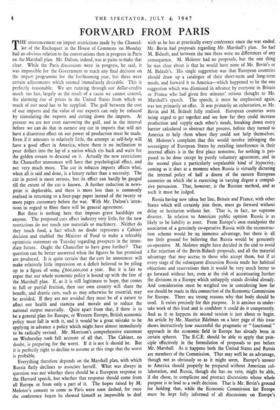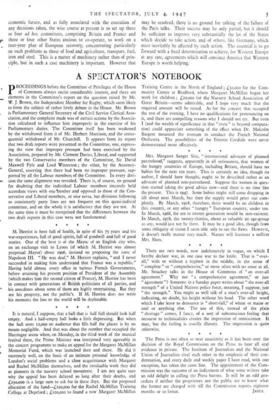FORWARD FROM PARIS
THE announcement on import restrictions made by the Chancel- lor of the Exchequer in the House of Commons on Monday had an obvious relation to the conversations then in progress in Paris on the Marshall plan. Mr. Dalton, indeed, was at pains to make that clear. While the Paris discussions were in progress, he said, it was impossible for the Government to reach any final decision on the import programme for the forthcoming year, but there were certain adjustments which seemed immediately desirable. This is perfectly reasonable. We are running through our dollar-credits much too fast, largely as the result of a cause we cannot control, the alarming rise of prices in the United States from which so much of our need has to be supplied. The gulf between the cost of our imports and the value of our exports can only be reduced by stimulating the exports and cutting down the imports. At present we are not even narrowing the gulf, and in the interval before we can do that in earnest any cut in imports that will not have a disastrous effect on our power of production must be made. Even if it amounts to relatively little, the attempt at self-help will have a good effect in America, where there is no inclination to pour dollars into the lap of a nation which sits back and waits for the golden stream to descend on it. Actually the new restrictions the Chancellor announces will have that psychological effect, and not very much more. The cut in tobacco imports affects what, when all is said and done, is a luxury rather than a necessity. The nit in petrol is more serious, but its effect can hardly be gauged till the extent of the cut is known. A further reduction in news- print is deplorable, and there is more loss than is commonly realised in returning to a four-page paper instead of the twenty or more pages customary before the war. With Mr. Dalton's inten- tions in regard to films there will be general agreement.
But there is nothing here that imposes grave hardships on anyone. The proposed cuts affect industry very little, for the new restrictions do not touch raw materials or machinery. Neither do they touch food, a fact which no doubt represents a Cabinet decision and enabled the Minister of Food to make a tolerably optimistic statement on Tuesday regarding prospects in the imme- diate future. Ought the Chancellor to have gone further? That question can be better answered when the figures he has promised are produced. It is quite certain that the cuts he announces will make relatively little impression on a deficit believed to be piling up to a figure of some k600,000,000 a year. But it is fair to argue that our whole economic policy is bound up with the fate of the Marshall plan. If, as it is still legitimate to hope, that comes to full or partial fruition, then our own country will share the benefit, and drastic cuts, such as may otherwise be essential, may be avoided. If they are not avoided they must be of a nature to affect our health and stamina and morale and to reduce the national output materially. Quite apart from that, if there is to be a general plan for Europe, or Western Europe, British economic policy must fall in with it, and it would be a great mistake to be applying in advance a policy which might have almost immediately to be radically revised. Mr. Morrison's comprehensive statement on Wednesday took full account of all that. The Cabinet, no doubt, is preparing for the worst. If it is not it should be. But it is perfectly right to decline to assume at this stage that the worst is probable. Everything therefore depends on the Marshall plan, with which Russia flatly declines to associate herself. What was always in question was not whether there should be a European response to the Harvard speech, but whether that response should come from all Europe or from only a part of it. The hopes raised by M. Molotov's consent to come to Paris were soon dashed, for once the conference began he showed himself as impossible to deal with as he has at practically every conference since the war ended. Mr. Bevin had proposals regarding Mr. Marshall's plan. So had M. Bidault, and between the two there were no differences of. any consequence. M. Molotov had no proposals, but the one thing he was clear about is that he would have none of Mr. Bevin's or M. Bidault's. His single suggestion was that European countries should draw up a catalogue of their short-term and long-term needs, and forward it to America—which happened to be the one suggestion which was dismissed in advance by everyone in Britain or France who had given five minutes' serious thought to Mr. Marshall's speech. The speech, it must be emphasised again, was not primarily an offer. It was primarily an exhortation, as Mr. Bevin and M. Bidault fully realised. European countries were being urged to get together and see how far they could increase production and supply each other's needs, breaking down every barrier calculated to obstruct that process, before they turned to America to help them where they could not help themselves.' M. Molotov's complaint that this would involve infringing the sovereignty of European States by entailing interference in their internal affairs is in the first place nonsense, for nothing is pro- posed to be done except by purely voluntary agreement, and in the second place a particularly unpalatable kind of hypocrisy, coming as it does at a moment when Russia is virtually dictating the internal policy of half a dozen of the eastern European countries on which she is exercising in varying degree a compul- sive persuasion. That, however, is the Russian method, and as such it must be judged.
Russia having now taken her line, Britain and France, with other States which will certainly join them, must go forward without delay or hesitation without her. That is, in fact, no supreme disaster. In relation to American public opinion Russia is as likely to be liability as asset. From Europe's own standpoint the association of a genuinely co-operative Russia with the reconstruc- tion scheme would be an immense advantage, but there is all too little ground for believing that Russia would be genuinely co-operative. M. Molotmi might have decided in the end to avoid a flat rejection of the Bevin-Bidault proposals, and all the material advantage that may accrue to those who accept them, but if at every stage of the subsequent discussion Russia made her habitual objections and reservations then it would be very much better to go forward without her, even at the risk of accentuating further the divisions in a Europe which unhappily stands divided already. And consideration must be weighed too in considering how far use should be made in this connection of the Economic Commission for Europe. There are strong reasons why that body should be used. It exists precisely for this purpose. It is anxious to under- take work of this kind and is confident it could do it competently. And as it so happens its second session is just about to begin. An article by Mr. Maurice Edelman on a later page of this issue shows instructively how successful the pragmatic or " functional " approach in the economic field in Europe has already been in certain spheres. The E.C.E. should be able to apply that prin- ciple effectively in the formulation of proposals to put before Mr. Marshall. As it happens both the United States and Russia are members of the Commission. That may well be an advantage, though not as obviously so as it might seem. Europe's answer to America should properly be prepared without American col- laboration, and Russia, though she has no veto, might be able, if she chose, to complicate and protract discussions whose whole purpose is to lead to a swift decision. That is Mr. Bevin's ground for holding that, while the Economic Commission for Europe must be kept fully informed of all discussions on Europe's economic future, and as fully associated with the execution of any decisions taken, the wise course at present is to set up three or four ad hoc committees, comprising Britain and France and three or four other States anxious to co-operate, to work on a four-year plan of European recovery, concentrating particularly on such problems as those of food and agriculture, transport, fuel, iron and steel. This is a matter of machinery rather than of prin- ciple, but in such a case machinery is important. However that may be resolved, there is no ground for talking of the failure of the Paris talks. Their success may be only partial, but it should be sufficient to improve very substantially the lot of the States which decide to take action, and of others, like Germany, which must inevitably be affected by such action. The essential is to go forward with a fixed determination to achieve, for Western Europe at any rate, agreements which will convince America that Western Europe is worth helping.







































 Previous page
Previous page